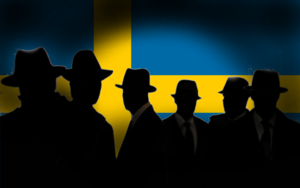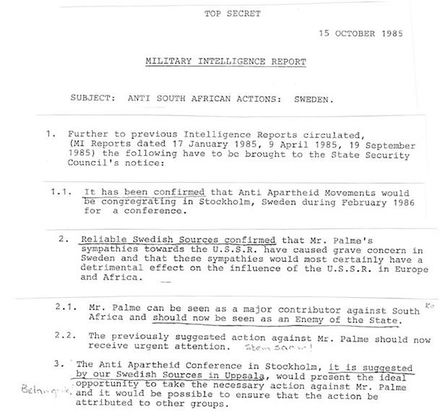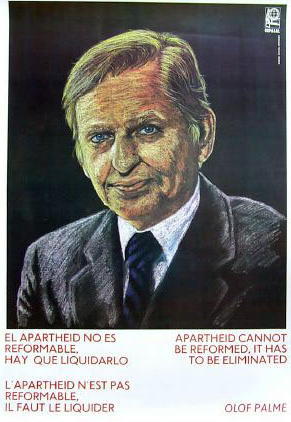Sweden/Deep state
(Deep state) | |
|---|---|
 | |
| Abbreviation | SV/DS |
| Interest of | Swedish Military Interpreter School |
| Exposed by | Ola Tunander |
| The Swedish deep state | |
Although known for its neutrality and progressive social policies, Sweden certainly has its deep state.
Contents
Background
Although a country that prides itself on social equality, it has a small, but virulently reactionary section of the bourgeoisie, including the aristocracy, business leaders and in the military. The country has its own military-industrial complex, with major arms companies such as Bofors,Saab, Kockums and Volvo Defense dependent on exports to stay alive.
Another deep state elements is the Wallenberg-family, one of Europe's leading banking and industry dynasties.
A third element is sections of the Social Democrat movement. In its anti-communist zeal, it allied with other deep state actors and foreign intelligence services, in the process creating its own intelligence apparatus.
History
Sweden is home to Sveriges Riksbank, the world's oldest central bank.
Events
- The extraordinary psychological warfare campaign in the 1980s to unseat the Social Democrat government under Olof Palme. Over a period of several years, US and NATO submarines penetrated Swedish territorial waters, with the intention of being observed. This campaign happened in collaboration with the Swedish admiralty, and created major embarrassment for the elected government. See the documentary The Reagan Method (Film). This false flag method was used again briefly in 2014-15, to influence public opinion against Russia.
- The IB-affair, where the Social Democratic Party had its own intelligence service, cooperating with the military intelligence, to spy on members of the unions and weed out unwanted left wing elements.[1]
- The sinking of the ferry M/S Estonia in 1994, killing over 800 people. A scandalously inadequate investigation covered up and ignored countless investigative threads. Theories involve NATO or Russian submarines sinking it, a bomb onboard, a failed attempt to transfer contraband while in rough weather on the high seas, and insurance fraud.[2]
- The Congress for Cultural Freedom and other US covert initiatives heavily influenced the Swedish press. The editor Herbert Tingsten and other editors across the political spectrum published several dozen stories every week given to them by the US services, without mentioning the source.[citation needed]
- The deep state politician Carl Bildt deserves his own entry. He was proven to be a confidential source of the US embassy (ie agent of influence). He was involved in many of the other events mentioned here, or in the investigation commitees of them. Since retiring as Swedish PM, he has been active abroad serving US/NATO foreign policy objectives.[citation needed]
- The SNS Tylösand Summit (see entry Axel Iveroth), which might be a local version of the Bilderberg summit
Assassinations
Olof Palme
- Full article: Olof Palme/Assassination
- Full article: Olof Palme/Assassination

The Swedish Prime Minister, Olof Palme, was assassinated on 28 February 1986, 4½ months after a document alleged to be a SADF Military Intelligence report concluded that Palme "should be seen as an enemy of the [South African] State." UK television reported on the day that Swedish police "don't suspect a political motive... they think, it could be the work of a madman".[3]
Anna Lindh
The politician Anna Lindh was assassinated on 11 September 2003, in the run up to a Swedish referendum about EU membership, possibly by a "lone nut".
People
An example
| Page name | Description |
|---|---|
| Sweden/Military |
Related Quotations
| Page | Quote | Author | Date |
|---|---|---|---|
| James Schlesinger | “[Former United States Secretary of Defense James R. Schlesinger] said 'The [Swedish] Military was planning for us to come as soon as possible'. He obviously did not speak about all Swedish politicians or all Swedish military officers, but rather about a fundamental divide between a few relevant political leaders with the ambition of keeping Swedish neutrality, and some senior military officers that were directly linked up to the U.S. agencies, officers that identified themselves with the United States and with U.S. military priorities: They planned for the U.S. military forces to come to Sweden 'as soon as possible'” | Ola Tunander James Schlesinger | 1993 |
| John Vessey | “When it comes to Sweden, there was only one rule: Nothing on paper.” | John Vessey John W Vessey Jr. | 1989 |
